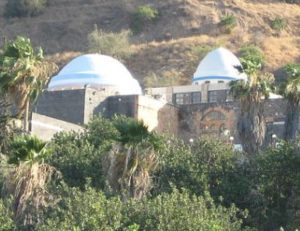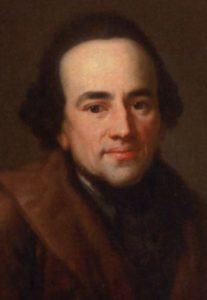Dear Friends,
After nearly 14 years of Jew of the Week, I’ve decided to hang up the skates and focus on other projects. It’s been a wonderful journey, and I thank all of you for the kind support, feedback, and suggestions – whether you’ve been subscribed from the very beginning or just joined recently. I will continue posting on my other blog, and YouTube channel. In the coming months, I hope to put together an anthology of some of the best and most inspiring Jew of the Week posts in book form. The website www.JewOfTheWeek.com will remain online as a valuable database of some 800 short biographies of great Jewish figures in history. Best wishes and please keep in touch!
Sincerely,
Efraim Palvanov
The “Prince” of Spanish Jewry
 Shmuel haLevi ben Yosef, aka Ismail ibn Naghrillah (993-1056) was born in Merida, Spain which was then under Muslim Arab rule. He studied to become a rabbi and was fluent in multiple languages including Hebrew, Arabic, and Latin. To make a living he became a spice merchant, and eventually moved to Granada and set up shop near the palace of the king. One of his customers there was the king’s chief secretary, Abu al-Kasim ibn al-Arif. Eventually, he hired Shmuel as an advisor, and later promoted him to tax collector. Shmuel showed his genius quickly and became very influential in the royal court. When the king passed away, Shmuel helped Badis ibn Habus ascend to the throne. In turn, Badis appointed Shmuel grand vizier and commander of the military. This made Shmuel the highest-ranking Jew in all of Spain. (He was a rare exception to the Pact of Umar which forbid a non-Muslim from holding office.) Shmuel served as grand vizier and prime minister for the rest of his life, holding the office for some three decades. He was the military commander for seventeen years, and his greatest moment came when he commanded the victory against the combined armies of Seville, Malaga, and the Berbers in 1047. He became known as Shmuel haNagid, “the Prince” or “the Ruler”. At the same time, he was the chief rabbi and leading authority on Jewish law for all of Spain. He established a prestigious yeshiva which would train many great Sephardic rabbis, including the father of the Rambam. He was a prolific writer and poet, uniquely combing Arabic poetic styles with Biblical Hebrew. Among his many works are a textbook on Hebrew grammar, and a primer on Talmud study called Mevo haTalmud. When he passed away, his son Joseph took over his position. (Tragically, jealous rivals assassinated him, then launched a pogrom slaughtering many Jews in what became known as the Granada Massacre of 1066.) Shmuel haNagid is regarded as a key figure in the “Golden Age” of Spanish Jewry, the most influential Jew in Spanish history, as well as a model for peaceful coexistence between Jews and Muslims. Kfar haNagid in Israel is named after him.
Shmuel haLevi ben Yosef, aka Ismail ibn Naghrillah (993-1056) was born in Merida, Spain which was then under Muslim Arab rule. He studied to become a rabbi and was fluent in multiple languages including Hebrew, Arabic, and Latin. To make a living he became a spice merchant, and eventually moved to Granada and set up shop near the palace of the king. One of his customers there was the king’s chief secretary, Abu al-Kasim ibn al-Arif. Eventually, he hired Shmuel as an advisor, and later promoted him to tax collector. Shmuel showed his genius quickly and became very influential in the royal court. When the king passed away, Shmuel helped Badis ibn Habus ascend to the throne. In turn, Badis appointed Shmuel grand vizier and commander of the military. This made Shmuel the highest-ranking Jew in all of Spain. (He was a rare exception to the Pact of Umar which forbid a non-Muslim from holding office.) Shmuel served as grand vizier and prime minister for the rest of his life, holding the office for some three decades. He was the military commander for seventeen years, and his greatest moment came when he commanded the victory against the combined armies of Seville, Malaga, and the Berbers in 1047. He became known as Shmuel haNagid, “the Prince” or “the Ruler”. At the same time, he was the chief rabbi and leading authority on Jewish law for all of Spain. He established a prestigious yeshiva which would train many great Sephardic rabbis, including the father of the Rambam. He was a prolific writer and poet, uniquely combing Arabic poetic styles with Biblical Hebrew. Among his many works are a textbook on Hebrew grammar, and a primer on Talmud study called Mevo haTalmud. When he passed away, his son Joseph took over his position. (Tragically, jealous rivals assassinated him, then launched a pogrom slaughtering many Jews in what became known as the Granada Massacre of 1066.) Shmuel haNagid is regarded as a key figure in the “Golden Age” of Spanish Jewry, the most influential Jew in Spanish history, as well as a model for peaceful coexistence between Jews and Muslims. Kfar haNagid in Israel is named after him.
The Very First Jew of the Week: Haym Solomon
Some Final Inspiring Jewish Words of the Week
In any situation, I ask myself what can be done. Whatever can be done, I do. What cannot be done, I do not worry about.
– Rabbi Simcha Wasserman (1898-1992)
Even in the smallest of insects, God’s unfathomable wisdom is apparent.
– Rabbi Yehuda haLevi (1075-1141), Kuzari
Humour is the Jewish way of defeating hate. What you can laugh at, you cannot be held captive by.
– Rabbi Lord Jonathan Sacks (1948-2020)
To be a miracle worker is no big deal—anybody of standing can overturn heaven and earth. But to be a Jew—now that’s difficult!
– Rabbi Yaakov Yitzchak of Peshischa (“The Holy Yid”, 1766-1813)
In faith, we firmly believe that what seems impossible is indeed possible.
– Rabbi Yitzchak Ginsburgh (b. 1944)
Get up in the morning and look at the world in a way that takes nothing for granted. Everything is phenomenal; everything is incredible; never treat life casually. To be spiritual is to be amazed.
– Rabbi Abraham Joshua Heschel (1907-1972)
Sometimes things happen about which the leaders of the generation remain silent. This does not mean that nothing is to be done… On the contrary: when aware that you are able to do something about it, you are obligated to do so.
– Rabbi Menachem Mendel Schneerson (“The Lubavitcher Rebbe”, 1902-1994)


